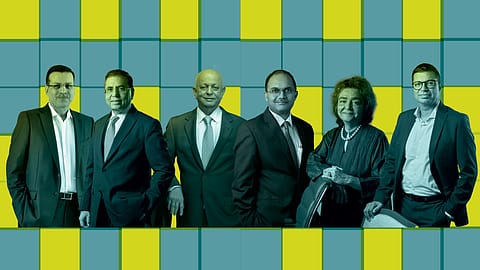How We Did It
The methodology, devised in collaboration with EY, takes into consideration quantitative as well as qualitative assessment of financial and strategic performance of the best CEOs.

This story belongs to the Fortune India Magazine October 2023 issue.
THIS IS THE SECOND edition of Fortune India’s ranking of India’s Best CEOs. The methodology, devised in collaboration with our knowledge partner, EY, takes into consideration quantitative as well as qualitative assessment of financial and strategic performance of the best CEOs.
We begin the process by extracting data for the last four fiscals — FY20 to FY23 — for all listed companies in the Registrar of Companies in order to identify their performance over the past three fiscals. A CEO’s performance can be judged by financial metrics, but there are usually other aspects that are not purely number driven. To bring in the qualitative aspects, the quantitative findings were presented to a jury. The jury this year comprised of Dr. Sanjiv Goenka, chairman, RP-Sanjiv Goenka Group (chairman of the jury); Mr. Hemendra Kothari, chairman, DSP Investment Managers; Mr. Prashant Jain, founder, 3P Investment Managers; Mr. Sanjiv Mehta, former CEO & MD, Hindustan Unilever (Mr. Mehta recused himself from discussions on his nomination); Mr. Vishal Mahadevia, MD, Warburg Pincus India; and Ms. Zia Mody, managing partner, AZB & Partners.
To identify the Best CEOs, we ran the numbers through a set of filters. First, we considered only companies with net sales of ₹1,000 crore or higher. Any company that incurred a loss during any of the three fiscals was not included. For all private firms, the CEO had to be in place for the entire three-year period of the survey. For public sector undertakings (PSUs) since CEOs usually have shorter stints, we considered all CEOs who were at the helm for at least one year. Companies that went public during the study period were not considered. Only companies with accounting periods between 9-15 months were considered. After applying all filters, a total of 305 companies qualified for the study, of which 51 were BFSI companies.
We considered three parameters — net sales, profit after tax (PAT) and total shareholder return (TSR) — each of which has a 33.33% weightage. Both net sales and PAT have two elements — absolute change and three-year CAGR. In addition, for banks, the return on assets (RoA) data was provided while for the rest it was return on capital employed (RoCE).
Companies were scored on average of year-on-year absolute change in net sales and PAT and three-year CAGR for the study period. Both absolute change and three-year CAGR have 16.66% weightage each.
We ranked companies by net sales. There are four categories: Super-large (net sales of over ₹100,000 crore); Large (net sales between ₹50,000 crore to ₹100,000 crore); Medium (net sales between ₹10,000 crore to ₹50,000 crore) and Emerging (net sales between ₹1,000 crore to ₹10,000 crore). The jury also identified winners for Super CEO 2023 and for Lifetime Achievement.
In addition, we identified winners in 18 sectors. These are Auto Ancillaries, Automobiles, BFSI, Capital goods, Cement, Chemicals, Consumer B2B, FMCG, Healthcare, Infrastructure Developers & Operators, IT Software: Large Companies, IT Software: Emerging Companies; Logistics, Metals & Mining, Pharma, Power, PSU and Textiles.
More Stories from this Issue
The jury was presented with financial data and company details that included strategic initiatives by the CEO during the study period; moves to focus on growth and steps to enhance profitability. The jury was provided details of the top three companies in each of the categories and sectors to identify the best performers. After an intense two-hour deliberation, the jury identified the Best CEOs for 2023.